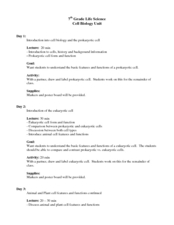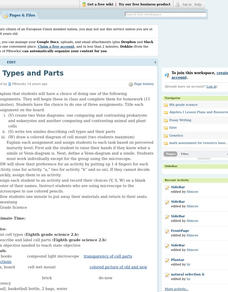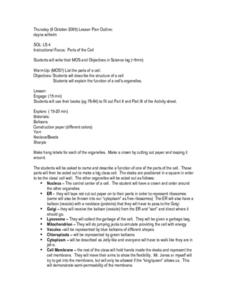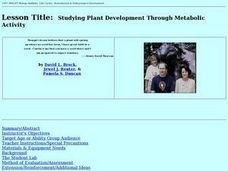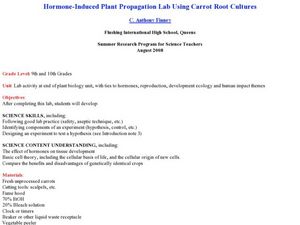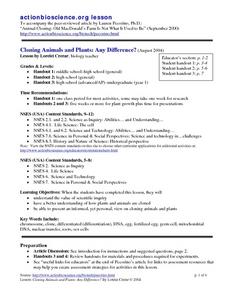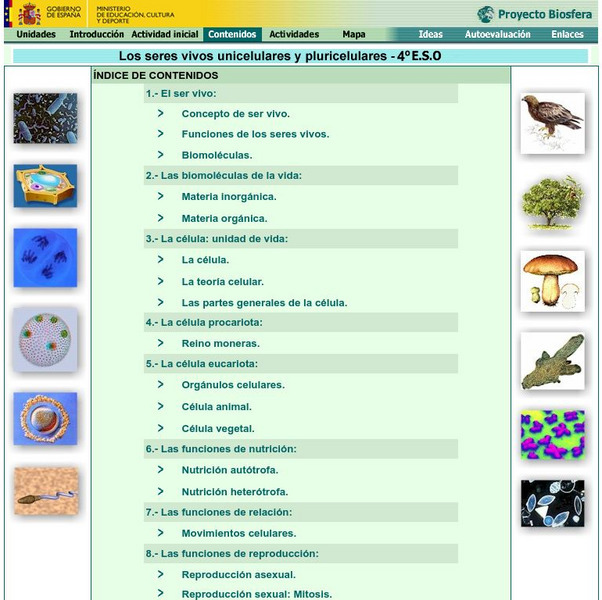Cornell University
Plant Cell Crime Scene
Use science to solve the mystery of the Poplar murder. Pupils use forensic botany to determine if a suspect could be the killer. By analyzing images from a Transmission Electron Microscope, learners determine if the material found on the...
Odell Education
Plant and Animal Cells
Incorporate multiple facets of the cell into your next high school lab! Through an introduction to cell organelles, class members observe each cell type and draw visuals to further demonstrate understanding of cellular processes in both...
Curated OER
Investigating Factors That Affect Cell Membrane Permeability
Cell membranes and the factors that affect its integrity are studied, with Beet tissue used as the model. A poster to display findings of the permeability of the membranes would clarify understanding and also allow a layer of language...
Curated OER
Cell Structures
Students differentiate between a prokaryotic and eukaryotic cell and give examples of both types. They differentiate between a plant and animal cell. Students will be able to name features common to both as well as unique features of each.
Curated OER
Cell (Biology)
High schoolers conduct a series of activities to explore the nature of cells. In this biology lesson, students observe plant and animal cells under the microscope and compare them. They differentiate osmosis and diffusion.
Virginia Department of Education
Cell Division
Searching for simple ways to teach mitosis to high schoolers? Using colored chalk and onion root tips, pupils visually demonstrate what they view when looking through the lens of a microscope. There are also various ways to expand the...
Pace University
Grade 6-8 Living Things
What characterizes a living thing? Scholars explore the concept during a differentiated instruction unit on living things. They perform lab experiments to determine how animals adapt to stimuli, watch videos and learn about...
Curated OER
Cell 7 Plant v Animal Cells
Students differentiate between plant and animal cells. They identify the structures central to plant cells. They complete a Venn Diagram listing the differences between animal and plant cells.
Curated OER
Cells And Their Parts
High schoolers investigate different types and their parts. They differentiate prokaryote and eukaryote cells and create a venn diagram displaying differences or similarities. Students write ten similes related to the cells and parts of...
Virginia Department of Education
Animal Phyla and Plant Divisions
Searched hours for an activity that allows individuals the ability to use multiple resources to learn about both plant and animal kingdoms? This discussion and activity provide pupils with the ability to visualize each organism...
Curated OER
Parts of the Cell
Students examine plant and animal cells to observe the organelles present in the cell, to match the function of each to the organelle on a cell model and to build a model of the plant or animal cell.
Curated OER
Comparing Mitosis with Meiosis
Life science learners view an online animated mini textbook comparing two types of cell division. Working in groups, they use a digital microscope to capture images of cells in different stages of mitosis and meiosis. Then they create an...
Curated OER
Genetics and Heredity: The Next Generation
Tenth graders work in teams to order events of DNA transcription and translation protein synthesis. In the second instructional activity, they put the steps of mitosis and meiosis in order using a concept map poster. They use modeling...
Curated OER
Studying Plant Development Through Metabolic Activity
A hands-on activity which allows young scholars to learn about cellular respiration. This lesson contains a range of investigations testing the rates of cellular respiration to demonstrate the relationship between metabolic rates of...
Curated OER
Plant Biotechnology: Controlling Tissue Differentiation
Students demonstrate hormonal control of plant tissue differentiation and relate this differentiation to gene expression. They explore the effects of hormones (auxin and cytokinin) on the genes that control tissue differentiation in callus.
Curated OER
Plant Biotechnology: Controlling Tissue Differentation
Students demonstrate skills of biotechnology stringent aseptic technique and statistical analysis. They describe hormonal control of plant tissue differentiation and relate this to gene expression. Students observe the effects of...
Curated OER
How do plant & animal cells make and use energy?
Pupils show the relationship between the need for plants to undergo photosynthesis in order to generate oxygen. They see the flaws associated with this thinking because of the lack of CO2 and H2O and lack of sufficient gravity in order...
Curated OER
Hormone-Induced Plant Propagation Lab using Carrot Root Cultures
Learners evaluate the importance of hormones in living things. For this biology lesson, students experiment on carrots to differentiate how humans and plants reproduce. They collect data from experiment to answer analysis questions.
Curated OER
REPRODUCTION
Students complete a variety of activities to study different concepts in Science. The activities are part of a layered curriculum. This is used to differentiate instruction and give a wide variety of assessment opportunities.
Curated OER
Plants
Student identify the characteristics of plants. Through hands-on demonstration, they create a model of plant parts. Students differentiate between the major divisions of the plant kingdom with a particular emphasis on the vascular and...
Curated OER
Photosynthesis
Fifth graders work in small groups to brainstorm responses to a problem related to some disaster that wipes out half or all plant life on earth. Groups complete a graphic organizer to compare and contrast their ideas. Students select...
Nuffield Foundation
Investigating the Effects of Biochar on Soil Fertility
Breathe some new life into charcoal. Scholars use biochar to improve soil fertility. They test the effectiveness of this addition by conducting an experiment with soil having 0%, 2%, and 4% biochar.
Curated OER
Cloning Animals and Plants: Any Difference?
Students examine the process in which plants and animals are cloned. They compare and contrast the two procedures and determine if there is a difference. They share their views on cloning to the class.
National Institute of Educational Technologies and Teacher Training (Spain)
Ministerio De Educacion: Los Seres Vivos Unicelulares Y Pluricelulares
In this unit you will be introduced to the complexity of living things. It also reviews the kingdom of nature, differentiating between their main features from those who are microscopic unit-cellular to the multi-cellular visible to the...




